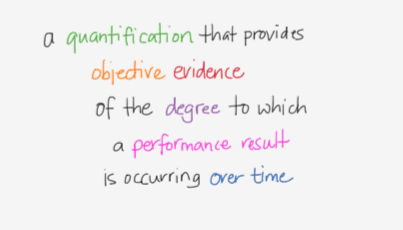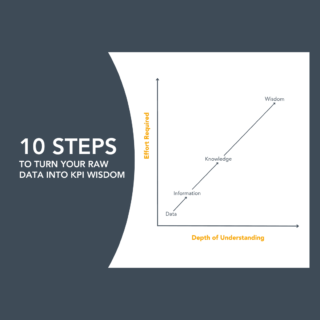Have you heard people throw out terms like Key Performance indicators (or KPIs for short), metrics, indicators, and measures? And have you secretly wondered what they really mean?
Truthfully, this performance measurement business can seem like a complicated world but, it doesn’t have to be.
So, let’s start by simplifying a couple things:
- First, all these terms mean virtually the same thing and from now on, I will only use the term performance measure (and you can too!).
- Secondly, let’s understand the Why of performance measures. They are used in a simple context: continuous improvement. Every organization has things they want to do better, and performance measures tell you (in a statistically valid way) whether you are doing better or not. This knowledge is very important! Why? Because organizations invest lots of money into people, projects and processes and you want to know if all this work is having any impact at all. And you don’t want to be guessing. You want to prove it!
But let’s face it: People struggle to develop performance measures that actually give them the business intel they need. So before I reveal the definition of a REAL performance measure, let’s explore what a performance measure is NOT.
A performance measure is NOT:
An action or initiative
For example:
- Develop partnerships for the delivery of training with major universities
- Implementation of a measurement system to improve fruit quality
A project milestone or event
For example:
- Complete our marketing plan by June 15, 2017
- Win Banksia Award for environmental sustainability
Activity completion
For example:
- 85% of staff have been briefed on the market plan
- Delivery of website upgrade
Sources of data
For example:
- Customer survey
- Occupational Health and Safety incident reports
Vague measure names
For example:
- Employee Engagement
- Environmental Footprint
- Google Analytics on Website Visitation
How do we know that these are not performance measures?
Because here is the definition of what a performance measure really is, courtesy of performance measure specialist Stacey Barr.
Pin this definition to your wall!

And what do these colourful words mean?
Quantification means your performance measure must be a statistic of some kind (a count, average, percentage, ratio, sum, etc.). Being quantitative means we can set targets that are sensible, but you don’t set targets right away (that comes later), you just need to appreciate that a single number is not a performance measure.
Objective means your performance measure must allow everyone to come up with the same conclusion when they use it. When it is objective, the measure has a consistent calculations (not a bunch of different versions), using the same data and that data is representative of the thing you are measuring. Objective also means that is it not influenced by personal feelings or opinions when representing the facts.
Evidence means your performance measure must be based on directly observable facts about the performance result you are trying to achieve (not hearsay!). It cannot be based on data about a different result (for example Net Profit is not evidence of customer satisfaction, even though they’re related). Evidence is directly observable in real life, with our physical senses (think CSI!).
Degree means your performance measure is not a simple Yes or No; rather it must be able to reveal how much something is changing on a continuous scale, not just whether it happened or not. It must be sensitive enough to pick up smaller changes that can provide the feedback you need as you execute actions overtime.
Performance result means that unless you measure the result (the end game of what your teams are trying to achieve), you don’t know what activities to adjust or change to get you closer. Measuring the result (even if you can only influence it and not control it 100%), is still more valuable than just counting stuff you do.
Over time means that everything in our organizations happen through time: our business planning, target setting, and action implementation. Unless we measure PROGRESS toward our desired result, through time, we don’t know whether we are heading in the right direction until it is too late.
So why do people get performance measures so wrong, so often?
Could it be that to develop performance measures that satisfy this definition, we need to be rigorous and deliberate? And we just don’t know how?
Instead we look for a “Silver bullet” – to avoid doing the hard work. But just like getting fit, you have to go to the performance measure gym.
Do you want to overcome your performance measurement struggles?
Click here to download the Whitepaper Measure what Matters and discover more about the 8-step performance measure process called The PuMP® Blueprint.
The PuMP® Performance Measure Blueprint was created by Australia’s performance measure specialist Stacey Barr. Louise Watson of Adura Strategy is Canada’s Official Partner and Licensed PuMP® Blueprint consultant.



